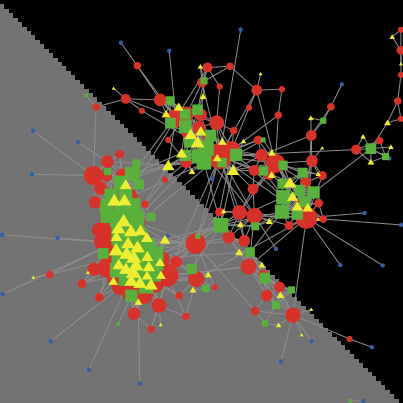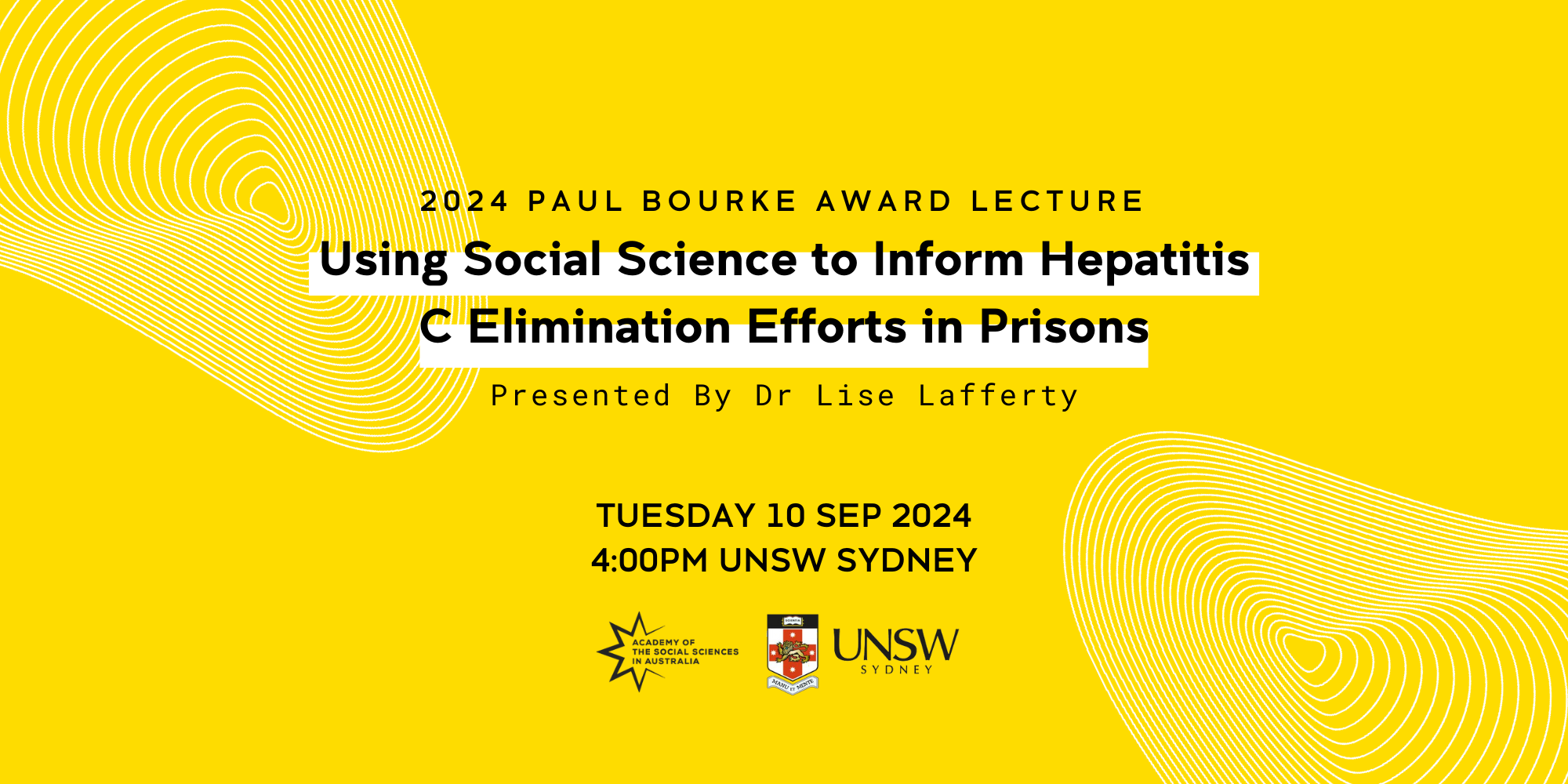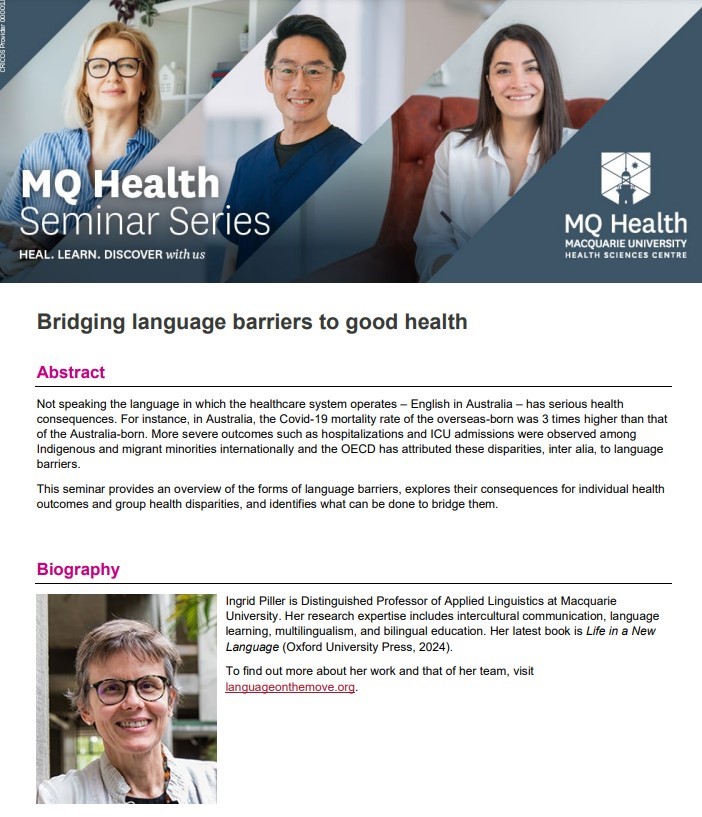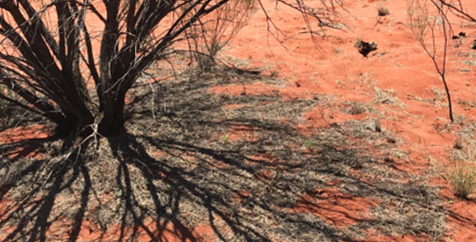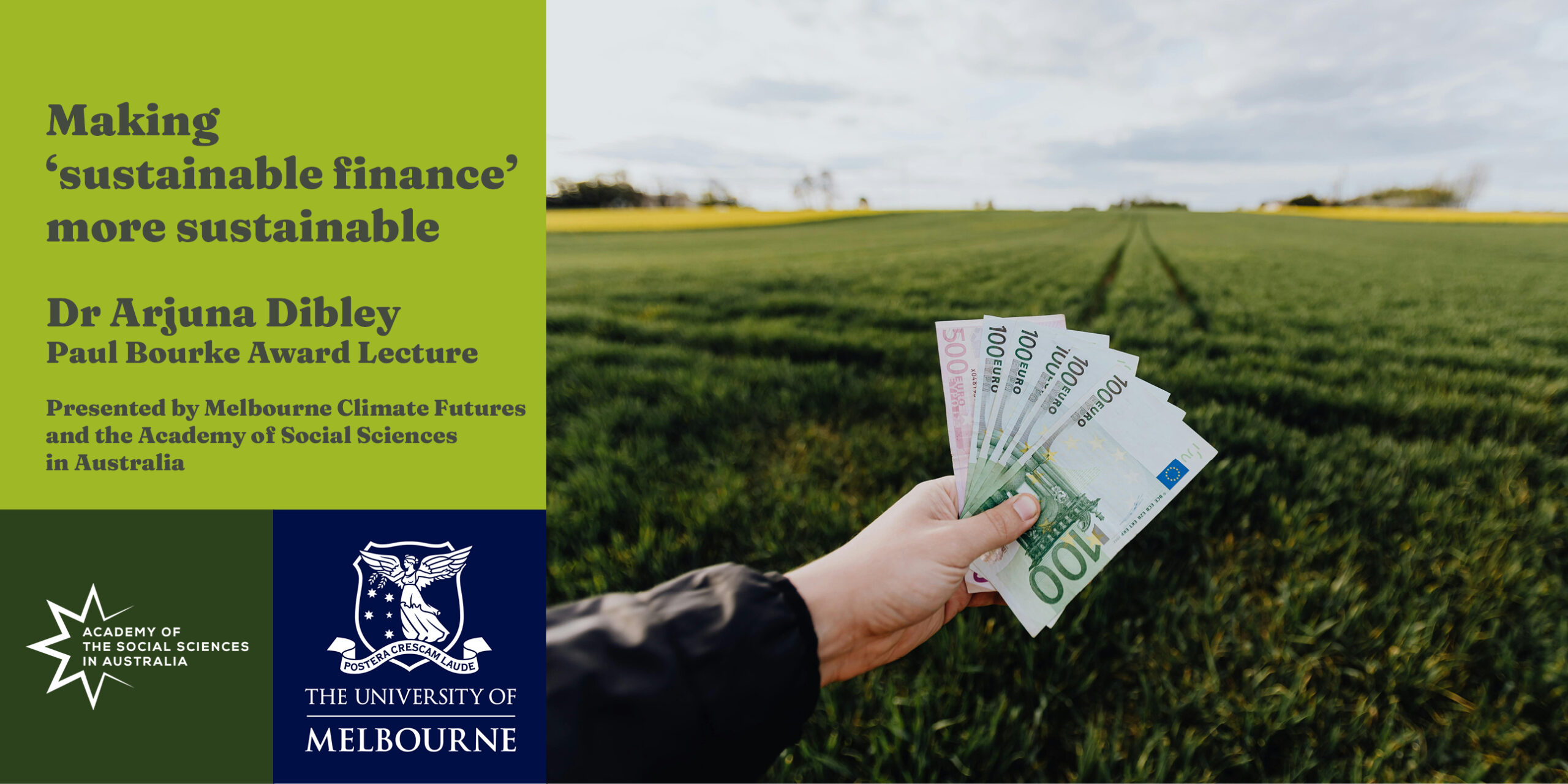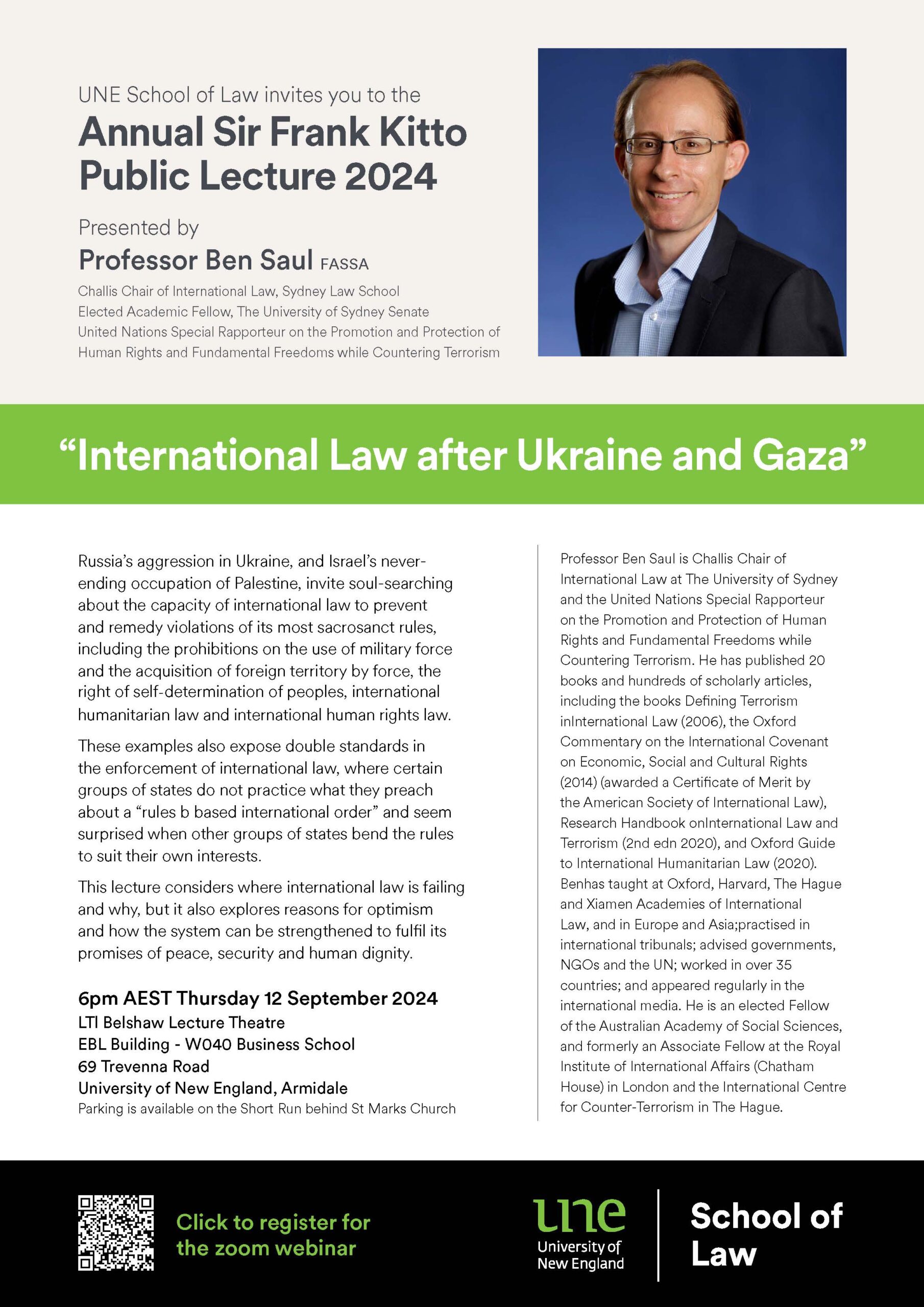Events
- Events
- Public Talk or Lecture
Using social science to inform hepatitis C elimination efforts in prisons
Kirby Institute Berg Seminar Room, Wallace Wurth Bld, UNSW Kensington Cnr High St & Botany St, UNSW, KensingtonDr Chantal Carr: Can the concept of care infrastructures play a role in regional energy transitions?
Macquarie University 25 Wally's Walk, North RydeAmani Haydar: Amani is a multi-award winning author, visual artist and advocate for women’s health and safety
Macquarie University 25 Wally's Walk, North RydeSSSWARM Seminar Series | Ethnography in the archive: listening, being, and doing in archival collections
Room 203, RD Watt Building, Science Road, University of Sydney, Camperdown Science Road, Camperdown Campus, SydneyWho’s on top? Inequality for the rich and poor
Macquarie University 25 Wally's Walk, North Ryde17th Annual Wheelwright Lecture: Dollar Hegemony as Law-Making Power, or How the Dollar Shapes the Rules of Global Capitalism
Lecture Theatre 200, Social Sciences Building (A02), The University of Sydney, Science RoadMaking ‘sustainable finance’ more sustainable
Lecture Theatre G08, Melbourne Law School 185 Pelham St, Carlton, MelbourneUNE School of Law Annual Sir Frank Kitto Public Lecture 2024 – Professor Ben Saul
Virtual +1 moreCaroline E Schuster: Tech for good? Anthropology and the quest for ‘ground-truths’ after weather disasters
Macquarie University 25 Wally's Walk, North Ryde- No events scheduled for 13 September 2024.
- No events scheduled for 14 September 2024.
Week of Events
CUTransitions Talk: Fuel prices and ambient air pollution: A study of Sydney
CUTransitions Talk: Fuel prices and ambient air pollution: A study of Sydney
CUTransitions Talks are learning sessions organised by the Centre for Urban Transitions, Swinburne University of Technology. In this session, Professor Paul Burke will discuss fuel prices and ambient air pollution. This talk explores the short-run influence of road transport fuel prices on ambient air pollution over the period 2004–2023 for the case of Sydney, Australia. Using daily and monthly data from nine air quality monitoring stations, we find generally negative effects of fuel prices on ambient levels of several key pollutants, with inelastic effect sizes. Higher gasoline prices are also linked to improved daily visibility levels and a reduction in Google search interest in air pollution. Wind speeds, bushfire incidence, and public holidays are among other key factors affecting Sydney air quality. The findings are useful for air pollution prediction and add to the body of understanding of the environmental benefits of fuel taxes. Professor Paul Burke is Head of the Arndt-Corden Department of Economics (ACDE) and Deputy Director of the Crawford School of Public Policy at the Australian National University. His research is in energy and environmental economics, with a focus on the Asia-Pacific. We look forward to seeing you at the Talk!
An introduction to Computational Social Science
An introduction to Computational Social Science
Computational social science (CSS) frequently uses Agent-based models (ABMs) to model social phenomena. ABMs are ‘bottom-up’ representations of individuals (computational agents) who exist within a society of other agents and who interact on a local scale based on sets of rules that govern their behaviour. When used like this, ABMs are attempts to create ‘Artificial Societies’ that we can study. The advantage of creating artificial societies is that imagined policies or interventions can then be made within these representations and the outcomes of those policies can be observed prior to implementation in the real world. The models can be anywhere between instructive or predictive, with the sophistication and detail of models often geared toward their purpose in this regard. In general, the most interesting models are those that try to replicate the generation of a large-scale social phenomenon when the mechanisms that create that phenomenon are currently unknown or contested (e.g., crowd behaviour, social behaviour, health behaviour, political behaviour, etc.). This session will introduce the audience to example agent-based models used in Computational Social Science and show how they can be used to augment existing research agendas, test theory, and trial simulated policies. We'll provide some very brief introductory 'how […]
Using social science to inform hepatitis C elimination efforts in prisons
Using social science to inform hepatitis C elimination efforts in prisons
Using social science to inform hepatitis C elimination efforts in prisons Please join us for the 2024 Paul Bourke Award Lecture given by Dr Lise Lafferty. In this address Dr Lafferty will reflect on a decade of social science research to understand key enablers and barriers to hepatitis C risk, prevention, testing and treatment in the prison setting. People who use drugs are overrepresented in prison settings globally. Once incarcerated, people who inject drugs frequently continue to do so. However, the risk factors for exposure to bloodborne viruses, such as hepatitis C, and other injecting-related infections significantly increase in prison settings. In this talk, Dr Lafferty will explore patient, healthcare provider, and correctional officer perspectives of different healthcare interventions which have been trialed and implemented with an aim to reduce hepatitis C transmission in the prison setting. She will also unpack the social, cultural and behavioural influences of hepatitis C risk navigation among people who inject drugs in prison. Dr Lise Lafferty is a recipient of the Academy of the Social Sciences in Australia’s prestigious Paul Bourke Award for Early Career Research. The Paul Bourke Lectures are named in honour of the late Paul Francis Bourke (1938–1999), President of the Academy […]
Dr Chantal Carr: Can the concept of care infrastructures play a role in regional energy transitions?
Dr Chantal Carr: Can the concept of care infrastructures play a role in regional energy transitions?
Energy transitions are social transitions, shifting existing patterns of everyday life and challenging shared societal values. This is especially evident in Australia’s carbon-intensive regions, where community capacities to cohere and care for each other are being re-shaped. In this paper I draw on the concept of care infrastructures to analyse some of the contemporary social dimensions of regional energy transitions. Care infrastructures are ‘forms that pattern the organisation of care within society’ (Power and Mee 2020: 489). The case study focuses on the Illawarra, a region on the cusp of a new wave of change prompted by imperatives to decarbonise heavy industry, the globalisation of coal capital, and the emergence of new renewables infrastructure, including offshore wind. I identify the care infrastructures that have long underpinned industrial change in the region, noting that capacities to care have always existed at the household and community scale. I examine the challenges energy transitions present for existing care infrastructures and identify where gaps are emerging around support for affected workers and the broader community, before concluding with some implications for transition planning and policy. Chantel Carr is an ARC DECRA Fellow in the Discipline of Geography and Sustainability at the University of Wollongong. […]
Amani Haydar: Amani is a multi-award winning author, visual artist and advocate for women’s health and safety
Amani Haydar: Amani is a multi-award winning author, visual artist and advocate for women’s health and safety
Peak bodies working to end violence against women in Australia recognise that violence is preventable but condoned and trivialised societally, emboldening perpetrators, and compromising systems of accountability. Amani lost her mother to domestic violence in 2015 and her grandmother was killed in Israeli violence in 2006. Drawing on lived expertise and contemporary conversations around coercive control and primary prevention, Amani will speak about the parallels between interpersonal abuse and state-sanctioned violence. She will examine the way tactics of victim-blaming, gaslighting and DARVO occur at the macro and micro levels and the ways in which survivors engage in creative resistance against these strategies. What are the impacts of these strategies on women and other vulnerable groups? How can feminists engage in more deliberate and meaningful critiques of state-sanctioned abuse in a time of genocide? If both pro-Palestine activists and activists against domestic violence believe that violence can be prevented, what knowledge can be shared across movements to give us a clearer understanding of how power and control is exercised over vulnerable individuals and populations? Amani’s ground-breaking feminist memoir The Mother Wound, published in 2021, explores the effects of domestic abuse and state-sanctioned violence. As an appointee to the DFSV Commission’s Lived Experience Advisory […]
Bridging Language Barriers to Good Health
Bridging Language Barriers to Good Health
Join Distinguished Professor Ingrid Piller as she explores the profound impact of language barriers on healthcare outcomes. Drawing on her extensive expertise in intercultural communication, multilingualism, and bilingual education, Ingrid will discuss the severe health consequences faced by non-English speakers in Australia, including a Covid-19 mortality rate three times higher among the overseas-born. The seminar will provide an overview of language barriers, their impact on health disparities, and practical strategies to bridge these gaps.
SSSWARM Seminar Series | Ethnography in the archive: listening, being, and doing in archival collections
SSSWARM Seminar Series | Ethnography in the archive: listening, being, and doing in archival collections
Hosted by Sydney Staff & Student Workshops on Anthropology, Research, and Methods (SSSWARM) and the School of Social and Political Sciences. Speaker: Henrietta Byrne (University of Sydney) This presentation utilises reflections from Henrietta's 2021 doctoral fieldwork to explore how anthropologists can bring ethnographic attention to archival materials. As part of her study on the legacies of nuclear testing on Anangu lands and peoples, she spent time in the National Archives of Australia (NAA) and Australian Institute of Aboriginal and Torres Strait Islander Studies (AIATSIS) archives, examining documents from the 1984 Royal Commission into British Nuclear Testing. She considers how archives can be rich sites for ethnography and how anthropologists can engage with colonial archival collections without upholding their epistemic power. Contact Michael Edwards with any questions about the SSSWARM Seminar Series: michael.edwards@sydney.edu.au For more info on SSSWARM: https://sophiechao.wixsite.com/ssswarm
Who’s on top? Inequality for the rich and poor
Who’s on top? Inequality for the rich and poor
Economic inequality shapes all our lives. But how does it play out at the top and bottom of the global economic order? This presentation uses three studies to examine this question. Hangyoung Lee will look at top wealth households in the United States and China, showing how the elite in these two countries have very different compositions. Jarvis Zhuo will present a study of one million Covid-19 deaths in the United States and show how between one in ten and one in seven deaths appear to be due to the low educational backgrounds of some of the most disadvantaged communities in the United States. Nicholas Harrigan will present a study of 10,000 residents of eight low-income villages in Cambodia, and show how inequality within villages shapes subjective wellbeing, with inequality having the most negative effects on the poorest households within these villages. Together, these three studies show the causes and consequences of inequality in a diverse range of settings, with the unifying insight that inequality changes lives and shapes the societies in which we live.
17th Annual Wheelwright Lecture: Dollar Hegemony as Law-Making Power, or How the Dollar Shapes the Rules of Global Capitalism
17th Annual Wheelwright Lecture: Dollar Hegemony as Law-Making Power, or How the Dollar Shapes the Rules of Global Capitalism
Speaker: Ntina Tzouvala, Australian National University Lawyers are latecomers in discussions about dollar hegemony and its effects on international relations and order. The overt weaponisation of the US Dollar in the past 10-15 years has made this reality impossible to ignore, but has largely directed legal debates toward the urgent, but limited, question of sanctions. In addition, discussions about dollar hegemony and the law often focus on the crucial, but unnecessarily narrow, issue of monetary sovereignty. Taking these two issues seriously, this lecture will suggest that they are only part of a broader range of powers and privileges afforded to the United States by dollar hegemony. Deploying a materialist understanding of international law-making, I will suggest that dollar hegemony operates as law-making power in ways antithetical to notions of equal sovereignty that emerged after decolonisation. In so arguing, I also aim to open a dialogue both with heterodox political economists and with law and political economy (LPE) scholars about the precise relationship between international law and the political economy of global capitalism. Ntina Tzouvala is Associate Professor at the ANU College of Law. Her work focuses on the political economy, history and theory of international law. She is the author of Capitalism […]
Making ‘sustainable finance’ more sustainable
Making ‘sustainable finance’ more sustainable
As we count down to COP29 in Azerbaijan this November, global policymakers are dubbing it the ‘finance COP’. Funding climate action, domestically and internationally, is one of the critical challenges in the campaign against climate change. There has never been a more crucial moment to optimise the sustainable finance movement, scaling up green investment and reducing investment in ‘dirty’ assets and companies. Following on from receiving the Academy of Social Sciences in Australia's 2023 Paul Bourke Award for Early Career Research, Dr Arjuna Dibley, Head of the Sustainable Finance Hub at the University of Melbourne, will present this lecture reflecting on the trajectory of sustainable finance, and how it could be shaped in its next phase to improve ambition and scale. Join us for an evening examining the current state and future of sustainable finance, introduced by Victorian Department of Treasury and Finance Secretary, Chris Barrett, and moderated by Mondiale Impact Managing Partner and University of Melbourne Enterprise Professor, Rosemary Addis AM. Speakers Dr Arjuna Dibley, Head of the Sustainable Finance Hub, University of Melbourne Dr. Arjuna Dibley is a Senior Research Fellow at Melbourne Climate Futures. He is also an Honorary Research Associate at the University of Oxford’s Smith-School for Enterprise […]
UNE School of Law Annual Sir Frank Kitto Public Lecture 2024 – Professor Ben Saul
UNE School of Law Annual Sir Frank Kitto Public Lecture 2024 – Professor Ben Saul
"International Law after Ukraine and Gaza" Russia’s aggression in Ukraine, and Israel’s never-ending occupation of Palestine, invite soul-searching about the capacity of international law to prevent and remedy violations of its most sacrosanct rules, including the prohibitions on the use of military force and the acquisition of foreign territory by force, the right of self-determination of peoples, international humanitarian law and international human rights law. These examples also expose double standards in the enforcement of international law, where certain groups of states do not practice what they preach about a “rules b based international order” and seem surprised when other groups of states bend the rules to suit their own interests. This lecture considers where international law is failing and why, but it also explores reasons for optimism and how the system can be strengthened to fulfill its promises of peace, security and human dignity.
Caroline E Schuster: Tech for good? Anthropology and the quest for ‘ground-truths’ after weather disasters
Caroline E Schuster: Tech for good? Anthropology and the quest for ‘ground-truths’ after weather disasters
This August, South America experienced a deadly heat wave, topping 40˚C in the middle of winter. Flash flooding, wildfires, and oceanic waterspouts are just some examples of what we might call ‘global weirding’ – weird, extreme weather events are becoming the norm. Many areas, including here in Australia, are at risk of becoming uninsurable. This talk explores new technology that is promising a financial safety net for vulnerable communities who are dealing with these environmental perils. Parametric insurance uses remote sensing technologies, weather stations, and state of the art climate models, to link policies to the weather itself – if a drought strikes, the insurance pays. And yet for all of their technological sophistication, do these novel financial arrangements actually work for the small family farms they cover? Taking an anthropological approach means we can ask hard questions about competing views of what the “ground-truth” is, how damage is measured, and who is ultimately responsible for making life liveable in increasingly unknowable and unrecognisable environments. Caroline E. Schuster is an Associate Professor in economic anthropology at the Australian National University. Her most recent book, Forecasts: a story of weather and finance at the edge of disaster (2023, University of Toronto […]


